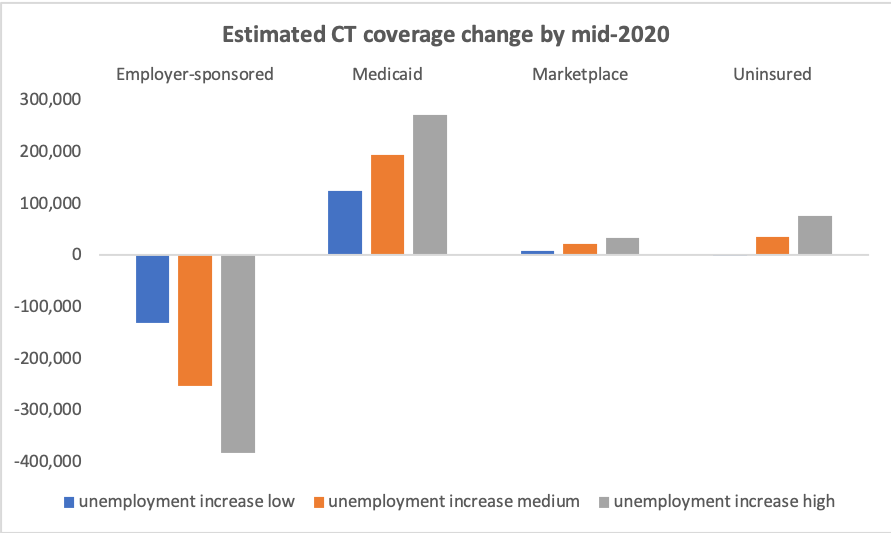insurance
CT hospitals would fare better than most if all payers used Medicare payment rates
A new study published in Health Affairs finds that if commercial payment rates were set at fee-for-service Medicare levels in 2017, US hospital revenue (inpatient and outpatient) would drop by 35%. Interestingly, also raising Medicaid rates to Medicare levels does little to mitigate that, changing the revenue loss to 30%. However, the authors note that…
Read MoreProtecting affordability in a pandemic — Experts find fair prices for remdesivir between $10 and $4,500
In a nation hungry for good news in fighting the COVID-19 pandemic, remdesivir has emerged as a first ray of hope. The FDA has quickly approved the drug for emergency use with seriously ill patients. However there are concerns that the data supporting remdesivir’s effectiveness has not been published or peer reviewed by independent scientists…
Read MoreCTNJ: Forecast Estimates More Than 100,000 New CT Medicaid Members
According to modeling by Health Management Associates, the COVID-19 pandemic could raise Connecticut’s Medicaid rolls 15% to 32% by mid-2020, depending on how much unemployment grows. Connecticut residents with employer-sponsored coverage could drop by 130,000 to 382,000 and Access Health CT coverage could grow by 8,000 to 33,000. Uninsured could rise by 77,000. Read more
Read MoreCTNJ: Analysis — Will COVID-19 Make Health Insurance Premiums Skyrocket?
Not necessarily. COVID-19 could cost the US between $34 billion and $251 billion for testing, treatment and care. Some analysts have predicted that premiums will rise between 4% and 40% next year because of the pandemic. Because consumers, taxpayers and workers ultimately pay the bills, from our taxes, our lost wages, our premiums, and directly…
Read MoreNew, confusing twist on state’s HIE plans to sell insurers access to personal medical records
In new information, the Office of Health Strategy says their Health Information Exchange (HIE) will not provide insurers or large health systems — Accountable Care Organizations (ACOs) – access to individual patients’ data. Advocates and providers have raised concerns that access to personal medical records could allow insurers and ACOs to inappropriately limit care and…
Read MoreIs Connecticut ready for COVID-19?
Almost half (45%) of Connecticut adults have one or more clinical risks that could complicate COVID-19 infections, very close to the US average of 44%, according to a new report from the Commonwealth Fund. The report compares states across clinical risk factors of adults, state health system capacity, insurance coverage and other cost barriers to…
Read MoreCTNJ: The recession is here, and healthcare is in the center of it
After the longest economic recovery in US history, we’ve been expecting a recession for a long time. We knew when it came, Connecticut healthcare would be hit hard. But no one expected this. Connecticut didn’t fare well in the last recession and we took longer than other states to build back the jobs we lost.…
Read MoreMore HIE concerns from advocates and others
Public comment to the Office of Health Strategy about the state’s planned Health Information Exchange raised concerns, including those regarding privacy and selling/monetizing the data shared in the advocates letter. Connecticut’s three legal services agencies sent a letter with similar concerns on Friday. Advocates’ concerns were raised by members at last week’s online Health IT…
Read MoreACA turns ten in troubled times
Ten years ago today, President Obama signed the Affordable Care Act. While the nation is now reeling from a terrible pandemic, imagine if 17 million more Americans didn’t have healthcare coverage, insurers could still drop people with pre-existing conditions, and charge women and cancer survivors more. While it was important, the ACA was never meant…
Read More22 advocates send letter to OHS opposing sale of personal medical records
Twenty-two independent advocates and providers signed a letter today to the Office of Health Strategy raising concerns about the state’s plans to develop a Health Information Exchange. The writers urge the state not to sell/monetize personal medical records and to adopt a strong consent policy giving consumers control over our own sensitive medical records. Advocates…
Read More








